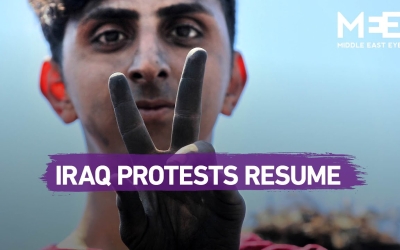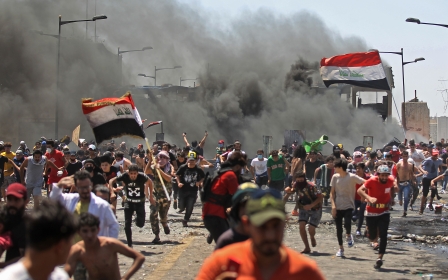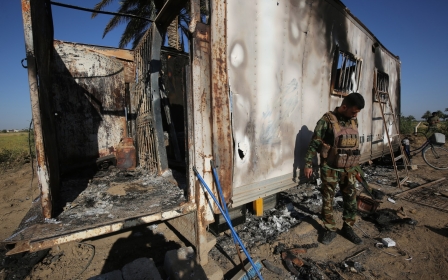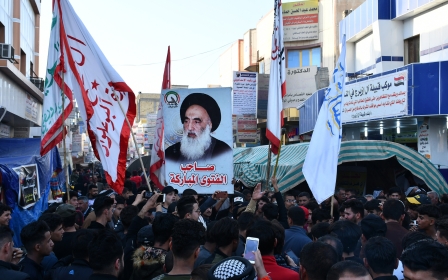Iraq's new prime minister makes moves to placate protesters

Iraqi Prime Minister Mustafa al-Kadhimi has only been in office five days, but already a chief challenge and goal for his fledgling government has become clear: placating Iraq's protest movement.
The six-month-old movement is one of a litany of challenges Iraq's new premier faces. The country is being buffetted by an oil price crash, coronavirus and an Islamic State group resurgence, not to mention tensions between the US and Iran.
But, now overseeing the closest thing to a stable government the country has witnessed since former premier Adel Abdul Mahdi was ousted by anti-government demonstrations six months ago, Kadhimi has made Iraq's protesters an early priority.
Among the moves he has made so far has been reinstating Lieutenant General Abdulwahab al-Saadi into the Counter-Terrorism Services (CTS), and promoting him to head of the elite unit.
Saadi's removal from the CTS in September was seen as a catalyst for the anti-government protests that followed - he had been widely viewed as a war hero for his role in defeating the Islamic State group (IS), as well as a non-sectarian figure who was popular across the country's religious divide.
New MEE newsletter: Jerusalem Dispatch
Sign up to get the latest insights and analysis on Israel-Palestine, alongside Turkey Unpacked and other MEE newsletters
'We didn’t protest to put Saadi back - Saadi deserves that and he is a good man. But still Kadhimi is trying to convince poor people that he is the new Abd al-Karim Qasim'
- Waad Alhafiz, doctor and activist
The arrest of a group who opened fire on demonstrators at the weekend, and the issuing of orders to security forces not to respond with force to protests, have also been seen as attempts to reconcile with the activists.
Over the weekend he also ordered the release of protesters arrested since the beginning of the unrest in October, and promised to uncover "the truth about everything that happened" in the previous half-year.
Despite these gestures, however, there has been widespread scepticism from the protest movement about his candidacy - primarily because of the political class who put him in office.
"I don’t think that he will do good because he is one of them," said Waad Alhafiz, a doctor and activist based in Baghdad, referring to Iraq's political class.
"We didn’t protest to put Saadi back - Saadi deserves that and he is a good man. But still Kadhimi is trying to convince poor people that he is the new Abd al-Karim Qasim," added Alhafiz, referring to Iraq's first republican president.
He also pointed out that Kadhimi had been chief of intelligence since 2016 and said it was hard to believe that he wasn't fully aware of who had been behind the killing of protesters.
"He definitely knows everything."
'Peaceful escalation'
On Sunday, with Iraq boasting of having largely contained the coronavirus outbreak, demonstrators returned to the streets across the country, restating their demands for an end to endemic corruption, unemployment, a lack of public services and intervention by foreign powers.
In a video statement released by protesters in Baghdad, they swore they would bring the Kadhimi government down if he failed to prosecute Abdul Mahdi for his role in the death of protesters.
"If you want to allow retirement for Adel Abdul Mahdi, none of the protesters of Tahrir Square will allow this!" said one of the activists.
"Mustafa al-Kadhimi - today is the first day of peaceful escalation and there are many wounded protesters. I advise you: do not contribute to the [spilling of] the blood of the protesters, because you will be just like those who went before you!"
Since October, more than 550 people have been killed in violence at anti-government rallies, either at the hands of security forces or shadier armed groups.
'Even if the pandemic isn’t over I’ll wear a mask and I’ll go. It’s our country, our past and future. It’s everything to us'
- Waad Alhafiz, doctor and activist
Later that evening in Basra, demonstrators surrounded the offices of an obscure political party, Tha'raAllah, protesting against a political class they said is incurably corrupt. During that protest a 20-year-old protester was shot in the head and later died in hospital.
A few hours later, the offices of Tha'raAllah were raided by security forces, leading to the arrest of five men. Security officials said the raid had been carried out on the direct orders of the prime minister's office.
For many years now, there have been vast amounts of weapons in Iraq in the hands of people outside the state's control.
Numerous armed groups - some linked to the state, some not - continue to operate in the country, and have been blamed for organised crime, imposing conservative social mores and taking part in the killing and kidnapping of activists.
Sajad Jiyad, a political analyst based in Baghdad, said that the Tha'raAllah arrests were an indication that Kadhimi was serious about reining in these groups.
"I think he has to be serious about it because otherwise this will be the reason why he fails or lead to him losing his job like his predecessor," he explained.
Return of Saadi
The return of Saadi to CTS is another indicator that Kadhimi is keen to reposition the country's security structure.
Both Kadhimi and Saadi have been seen as closer to the US than to Iran, and there is little love lost between them and the Iran-backed elements of the Hashd al-Shaabi paramilitary groups.
Prior to Kadhimi's ascendency to the premiership, the armed group Kataeb Hezbollah warned that there could be "war" in the country if he took the role, accusing him of involvement in the killing of Iranian military commander Qassem Soleimani and militia leader Abu Mahdi al-Mohandis in early January.
Similarly, the sacking of Saadi in September by Abdul Mahdi has been seen by many as punishment for his closeness to the US, with the then-prime minister cryptically saying Saadi had been "visiting embassies".
Jiyad said that, despite tensions, there was a wide consensus even among the Hashd al-Shaabi about Saadi's abilities as a military operator, and the need for cooperation on security issues.
'The groups that have clashed with al-Saadi in the past will be watching him and wary that he may seek to undermine them as some point'
- Sajad Jiyad, analyst
"I think operationally they will welcome the return of Abdulwahab al-Saadi. However, the groups that have clashed with him in the past will be watching him and wary that he may seek to undermine them at some point," he explained.
"But I don't think that's what his actual efforts will focus on. I think he'll understand now with what happened with his sacking in September, he'll understand the importance of trying to be politically correct and not provoke his enemies."
Jiyad added said that although Saadi's reappointment by Kadhimi was definitely a way to win some broad support from both the protest camp and from Iraqi society as a whole, it was primarily Saadi's skills and increasing concerns about the resurgence of IS that motivated him.
"The new prime minister is obviously concerned about the resurgence of IS, and has noted that the CTS seems to have not operated to the highest levels since the departure of Abdulwahab al-Saadi," he explained.
"I think he wants to send a message that the CTS is going to be very important in this coming period to prevent IS from regaining a foothold in the liberated areas especially."
'It’s our country, our past and future'
Though modest so far, the demonstrations seen over the weekend in Baghdad, Diwaniya, Nasiriyah, Baghdad and elsewhere suggest that rather than being snuffed out by the coronavirus pandemic, the mass anti-government movement was merely mothballed.
Alhafiz, the doctor, said that he and many of his friends were yet to take part in the renewed demonstrations, over fears that the coronavirus was still lingering in the country.
As a doctor, he said that he had seen a lot of suspected coronavirus cases who refused to be tested, over fears that they would be put into quarantine.
But eventually, he explained, there would need to be a return to the streets since fundamentally nothing had changed and Kadhimi would need to be held to account.
"Even if the pandemic isn’t over I’ll wear a mask and I’ll go," he said. "It’s our country, our past and future. It’s everything to us.
"For the sake of it and for the people who died here dreaming about a country."
Middle East Eye delivers independent and unrivalled coverage and analysis of the Middle East, North Africa and beyond. To learn more about republishing this content and the associated fees, please fill out this form. More about MEE can be found here.





